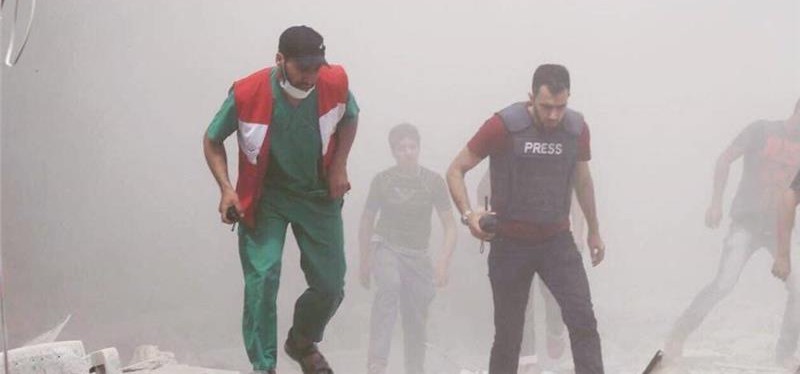PHOTO: Journalist Hadi al-Abdallah with rebels on the frontline in northern Syria:
Hadi al-Abdallah is one of the leading journalists on Syria’s frontlines. A pro-opposition activist from Homs, he has reported for years from battlefields from Qusayr to Idlib to Aleppo. He has documented not only the four-way fight between rebels, the Assad regime, the Islamic State, and Kurdish factions, but also the devastation and deaths among Syrian civilians.
Abdallah spoke with Al Jazeera English, in an interview published this week, about the situation in Aleppo city after a February 27 “cessation of hostilities”::
In recent weeks, international media has focused on the escalating situation in Aleppo. What have you seen so far?
I’ve been filming everything in Aleppo since the beginning of the military campaign launched by the Syrian and Russian air forces. I have documented many massacres committed by both forces including the one in Al-Quds Hospital, the hospital run by Doctors Without Borders.
See Syria Video: Russia-Regime Attack on Aleppo’s Al-Quds Hospital — New Footage and Testimony
However, since the beginning of the ceasefire, the situation in Aleppo has become quieter. The city isn’t being exposed to intense bombing in the way it was before. There are still ceasefire violations by the regime every day, mainly bombing from artillery, but it’s quieter than before.
But, we have to distinguish between Aleppo and the countryside. The Aleppo countryside never went through any truce or ceasefire, either from the side of the rebels or the regime forces, so fighting is still going on there.
And what’s the situation south of Aleppo?
When civilians were being bombed in the city, there was pressure on the Free Syrian Army and Islamic factions to open up a front with the regime so that civilians wouldn’t be bombed any more.
Many believed that if a new front opened up, the Russian and Syrian air forces would strike there, and the bombing on civilians would stop. So [the rebel bloc] Jaish al-Fatah took the town of Khan Tuman, and then the town of Khaldiya, from regime forces, as well as a series of hills close by.
See Syria Daily, May 6: Rebel Bloc Takes Key Town in South Aleppo Offensive
I went there [earlier this month] to cover the military operations. Since then, the fighting hasn’t calmed down.
The bombing is not only over Khan Tuman, but over all the western and southern areas in the Aleppo countryside. There, the bombing never stops.
How are civilians in rebel-held Aleppo faring since the ceasefire came in?
Civilians are beginning to restore their normal life, and the marketplaces are becoming busier, bit-by-bit. Some of the electricity cables that were cut during the last two weeks of military campaigns are being repaired. The streets are being cleared of rubble. But people are still afraid that the regime may carry out more ceasefire violations.
Who are the main rebel groups now in Aleppo?
Most of the brigades in Aleppo belong to the Free Syrian Army — groups like Jabhat al-Sham, the Nour al-Din al-Zinki Movement as well as the Mujahideen Army. Those are the most prominent groups, although there are some Islamist factions from Ahrar al-Sham, Jaish al-Islam and so on; however, it’s mainly FSA forces.
At the same time, there’s been some debate on whether or not al-Nusra Front maintains a presence in Aleppo – something the Russians and Syrians have used to justify recent air strikes on urban areas.
Al-Nusra is rarely seen inside Aleppo. There are some individuals from al-Nusra who hail originally from Aleppo and live inside the city, but there’s no headquarters for al-Nusra and they don’t have a significant presence inside Aleppo. They exist more as part of Jaish al-Fatah in the countryside to the south. As I said, the main presence in the city is the FSA.
In some of your recent videos, you’re reporting in neighborhoods of Aleppo while airstrikes are falling nearby. What’s it actually like to report in those sorts of conditions?
You’re in a neighborhood and it might be attacked by rockets from aircraft, barrel bombs or shells. I’ve seen civilians under the rubble of destroyed buildings; a father looking for his children under the rubble, a mother searching for her kids. The situation is very difficult.
What hopes do you have for the short-term truce?
Abdullah: Right now, I can hear military aircraft flying over Aleppo. That’s just proof of how fragile the ceasefire is. I’m not hopeful at all.

